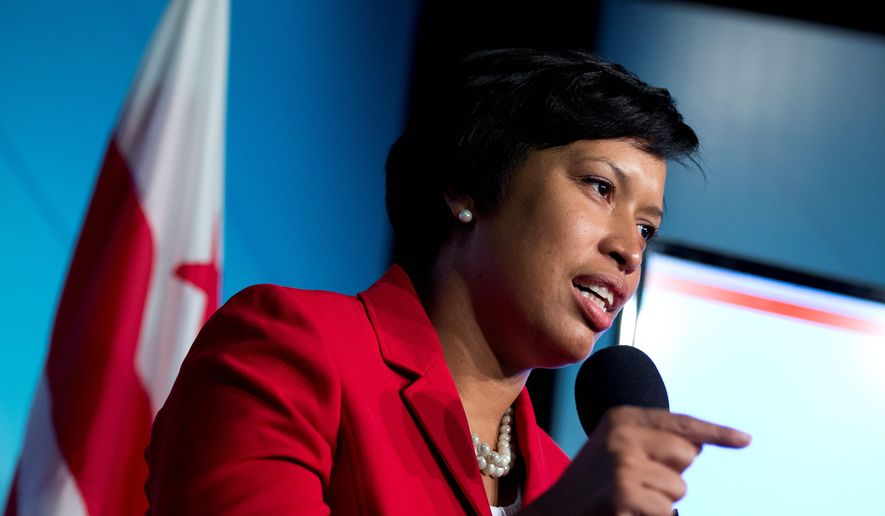The D.C. mayor’s office fought back Wednesday against accusations that Mayor Muriel Bowser’s plan to curtail the authority of the city’s first elected attorney general is a power grab, as a D.C. Council member urged both sides to hash out their disagreements.
Ms. Bowser’s representatives argued at a council committee hearing that her plan aims to protect her office’s current authority and fend off the potential for the city’s top attorney to have veto power over the mayor’s proposals.
“Giving the attorney general the exclusive authority to provide that legal advice overreaches and would amount to a mandate to seek the attorney general’s pre-approval before the mayor or the council could do their jobs,” said Beverly Perry, a special adviser to Ms. Bowser. “It would insert the attorney general into the day-to-day business of the executive and legislative branches in an unprecedented and intrusive manner.”
D.C. Attorney General Karl Racine said approval of the mayor’s proposal would undermine the will of voters, three-quarters of whom supported the creation of an elected attorney general position in a 2010 referendum.
“We fear this would leave the elected attorney general as being subordinate to the mayor,” said Mr. Racine, adding that under the mayor’s plan her appointed attorneys would provide her legal advice. “She can get us involved when she wants, tell us how she wants us to do things and tell us not to do certain things.”
Both Mr. Racine and Ms. Bowser have submitted bills that would alter the scope of work of the attorney general, and each side has criticized the other’s proposal as undermining their own authority.
Mr. Racine’s proposal would give the attorney general’s office wide discretion over legal matters, authorizing him to provide legal advice to all parts of the D.C. government and to review and certify legislation, land deals and contracts.
Ms. Bowser’s plan would transfer some of those responsibilities to the newly formed Mayor’s Office of Legal Counsel, overseen by former attorney general candidate Mark Tuohey. The office would have the authority to provide legal sufficiency reviews of legislation, regulations and contracts at the request of the mayor, though Ms. Perry said the attorney general also could conduct legal reviews if officials choose to do so.
Officials expressed concern about what would happen if both offices conducted legal reviews on a matter and came to different conclusions.
“Could this end up in court? It certainly could,” Mr. Tuohey said.
“Well, that’s exactly what I’m hoping to avoid,” said council member Kenyan McDuffie, the Ward 5 Democrat who oversaw the roundtable hearing. “If we go forward with the mayor’s proposal, this will end up in court. I don’t know how we avoid this.”
Mr. McDuffie also questioned whether the bill introduced by the mayor’s office was born out of a practical necessity to clarify the roles of city attorneys or the fear that Mr. Racine would broaden his authority.
“We’re here today not because there is a problem. We’re here today because the attorney general is seeking to expand his power. He’s overreaching,” said Ms. Perry, characterizing the mayor’s bill as reactionary to Mr. Racine’s proposal.
Mr. Racine said that even if both proposals were tabled and the city kept the current power arrangement, it would still leave unresolved a plan by the deputy mayor for planning and economic development to poach two lawyers from the attorney general’s office for its staff. The lawyers were offered salary boosts of $15,000 and $24,000 to do essentially the same job in a different office, he said.
Mr. McDuffie voiced concern over the possibility that both proposals could prove problematic in practice. He encouraged both sides to come together to talk out their differences on the issues, noting that no problems appeared to have risen out of the arrangement between the two offices.
“When the attorney general’s advice trumps the advice given by the Mayor’s Office of Legal Counsel, it could lead to protracted litigation in trying to outline the authority of this new office of the elected attorney general,” Mr. McDuffie said. “If every time there is a disagreement between the mayor on a legal issue and the attorney general on a legal issue and it would have to be resolved in the courts, it is going to be a problem.”
• Andrea Noble can be reached at anoble@washingtontimes.com.




Please read our comment policy before commenting.